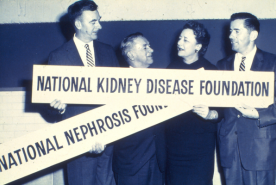August 12, 2014
 Do you know your risk factors for chronic kidney disease (CKD)? Risk factors are things that make it more likely you will have kidney disease. Some of them can be treated so you can work with your doctor to reduce risks of kidney disease. It is helpful to think of risk in terms of things you can change, and things you can't change.
Do you know your risk factors for chronic kidney disease (CKD)? Risk factors are things that make it more likely you will have kidney disease. Some of them can be treated so you can work with your doctor to reduce risks of kidney disease. It is helpful to think of risk in terms of things you can change, and things you can't change.
Do you know which of these diseases can lead to kidney problems?
- Diabetes
- Asthma
- High blood pressure (hypertension)
- Glomerulonephritis
- Something that blocks urine
✓ Diabetes
Type 2 diabetes is the number one cause of kidney failure, responsible for about one in three new cases. But, kidney disease does not always occur in people with diabetes. Those who keep their blood sugar under control are protecting their kidneys.
X Asthma
People with asthma are no more likely to have kidney problems than others.
✓ High Blood Pressure (Hypertension)
High blood pressure puts all blood vessels under extra pressure. This causes stress everywhere, but also in the kidney. After diabetes, hypertension is the next most common cause of kidney failure. But all people with high blood pressure do not have kidney failure. Those who keep their blood pressure less than 130/85 are protecting their kidneys. Blood pressure is best controlled through diet and exercise, medications and weight loss if you are overweight. Talk with your doctor about the best medicines for high blood pressure for you. Some people need to take more than one medicine to reach the target blood pressure.
✓ Glomerulonephritis
Glomerulonephritis is a disease caused by inflammation of the filtering units of the kidneys (glomeruli) Some types of glomerulonephritis run in families. Glomerulonephritis can also be the result of inflammation from infections like strep throat.
✓ Something that Blocks Urine
Blocking the flow of urine can damage the kidneys. Some of the possible blockages are kidney stones, scarring, birth defects, prostate enlargement, or injury. Kidney stones can be treated and some other blockages can be repaired or opened to help keep the kidneys functioning. Make sure to tell your doctor if you know or suspect that you may have a blockage now or in the past.
Which of these medicines or supplements can cause kidney problems?
- Painkillers (analgesics)
- Reactions to antibiotics
- Abuse of illegal drugs
- Injections of contrast dyes before an x-ray or CT scan
- Bowel preparations for colonoscopy
✓ Painkillers
Excessive use of painkillers containing ibuprofen (Advil®, Motrin®), naproxen (Aleve®), or others have been linked to kidney damage. It is usually safe to use painkillers as directed, but you should always talk to your doctor about any use of medicines, whether they are prescription or not.
✓ Reactions to Antibiotics
Reactions to certain antibiotics or other drugs may also cause kidney damage.
✓ Drug Abuse
Use of certain drugs, such as heroin or cocaine, can damage the kidneys. You should tell your doctor about past or current use of drugs. Methamphetamines can also damage the kidneys. Excessive alcohol use can also cause kidney problems.
✓ Injections of contrast dyes before an X-ray or CT scan
Serious kidney damage can be caused by the iodine-containing “dyes” that doctors use to enhance the quality of medical scans. These dyes are called contrast agents, and are usually given intravenously before a CT scan, angiogram or other test. Contrast-induced nephropathy is the medical name for kidney damage caused by contrast agents. When this develops, it can cause acute (sudden) kidney failure. Sometimes acute kidney failure will get better, but it may lead to CKD. People with CKD should ask about this when their doctor orders a CT scan, angiogram or angioplasty. If you aren't sure if you have chronic kidney disease, ask your doctor.
✓ Bowel preparations for colonoscopy
Some bowel cleaning products contain sodium phosphates. In some people, they can damage the kidneys, particularly if the person is dehydrated. The condition, acute phosphate nephropathy, is a form of kidney injury, associated with the use of oral sodium phosphate for bowel cleansing prior to colonoscopy or other procedures. These products include the prescription products Visicol® and OsmoPrep® and oral sodium phosphate products available over-the-counter without a prescription as laxatives (for example, Fleet Phospho-soda®). In some cases when used for bowel cleansing, these serious adverse events have occurred in patients without identifiable factors that would put them at risk for developing acute kidney injury. Before a colonoscopy, discuss bowel cleaning products and your kidneys with your doctors.
The below are kidney disease risk factors you can’t change (but being aware of them helps).
Which of these factors increase your risk of having kidney disease?
- Family history of kidney disease or high blood pressure
- Age
- Race or ethnicity
- Blue eyes
- Chronic infections
- Diseases of the heart and blood vessels
✓ Family History of Kidney Disease or High Blood Pressure
Kidney disease can run in families. If you have one or more family members who have CKD, are on dialysis, or have had a kidney transplant, you should tell your doctor. High blood pressure and diabetes—the leading causes of kidney disease—can also run in families. Be aware of your family history and share it with your doctor. A rare inherited disease called polycystic kidney disease causes large pockets filled with fluid that put pressure on normal kidney tissue. If you have a family history of this disease, tell your healthcare professionals.
✓ Age
As we age, kidney function gradually declines. Most aging people do not develop kidney failure, though. But older people should be monitored for kidney problems, because the older you are, the greater your risk.
✓ Race or ethnicity
Certain U.S. ethnic and racial groups have a higher risk of kidney disease. This includes African Americans, Hispanic Americans, American Indians, Pacific Islanders, and others. You should ask your doctor if you need to be tested more often for kidney disease.
X Blue eyes
There is no link between eye color and kidney disease. Whatever the color of your eyes, though, if you have any of the other risk factors, you should be tested for chronic kidney disease.
✓ Chronic infections
AIDS and hepatitis C can affect kidney function. You should be monitored more closely for CKD if you have one of these infections.
✓ Diseases of the heart and blood vessels
Having heart disease puts people at higher risk of kidney disease. This includes a history of a heart attack or stroke, congestive heart failure, left ventricular hypertrophy, and others. Also having chronic kidney disease puts people at higher risk of heart problems.








